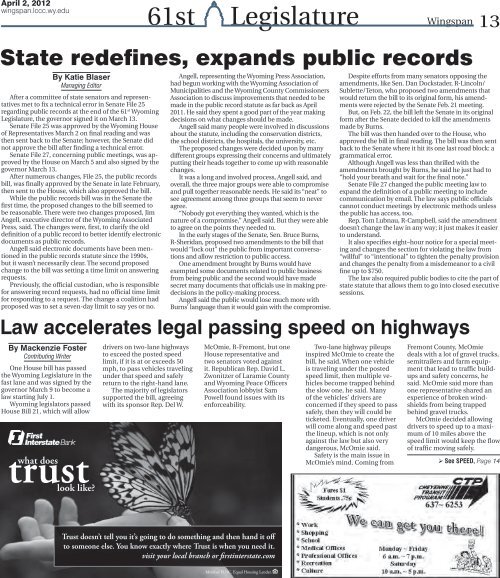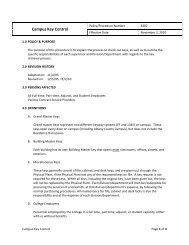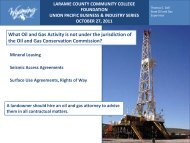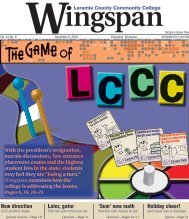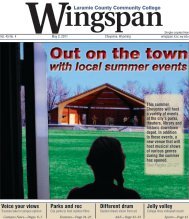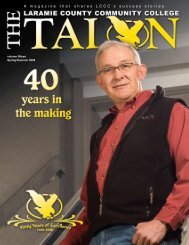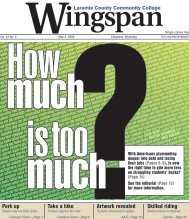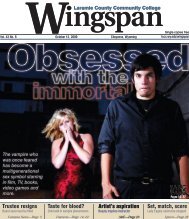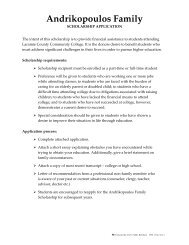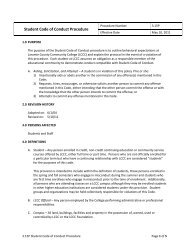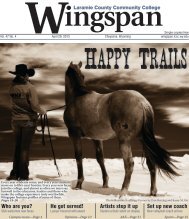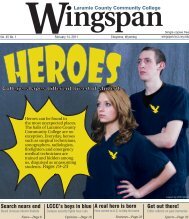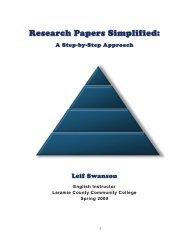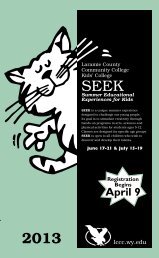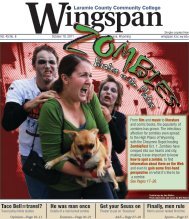Page 1.indd - Wingspan
Page 1.indd - Wingspan
Page 1.indd - Wingspan
- No tags were found...
You also want an ePaper? Increase the reach of your titles
YUMPU automatically turns print PDFs into web optimized ePapers that Google loves.
April 2, 2012wingspan.lccc.wy.edu61st Legislature<strong>Wingspan</strong> 13State redefines, expands public recordsBy Katie BlaserManaging EditorAfter a committee of state senators and representativesmet to fix a technical error in Senate File 25regarding public records at the end of the 61 st WyomingLegislature, the governor signed it on March 13.Senate File 25 was approved by the Wyoming Houseof Representatives March 2 on final reading and wasthen sent back to the Senate; however, the Senate didnot approve the bill after finding a technical error.Senate File 27, concerning public meetings, was approvedby the House on March 5 and also signed by thegovernor March 13.After numerous changes, File 25, the public recordsbill, was finally approved by the Senate in late February,then sent to the House, which also approved the bill.While the public records bill was in the Senate thefirst time, the proposed changes to the bill seemed tobe reasonable. There were two changes proposed, JimAngell, executive director of the Wyoming AssociatedPress, said. The changes were, first, to clarify the olddefinition of a public record to better identify electronicdocuments as public records.Angell said electronic documents have been mentionedin the public records statute since the 1990s,but it wasn’t necessarily clear. The second proposedchange to the bill was setting a time limit on answeringrequests.Previously, the official custodian, who is responsiblefor answering record requests, had no official time limitfor responding to a request. The change a coalition hadproposed was to set a seven-day limit to say yes or no.By Mackenzie FosterContributing WriterOne House bill has passedthe Wyoming Legislature in thefast lane and was signed by thegovernor March 9 to become alaw starting July 1.Wyoming legislators passedHouse Bill 21, which will allowtrustwhat doeslook like?drivers on two-lane highwaysto exceed the posted speedlimit, if it is at or exceeds 50mph, to pass vehicles travelingunder that speed and safelyreturn to the right-hand lane.The majority of legislatorssupported the bill, agreeingwith its sponsor Rep. Del W.Angell, representing the Wyoming Press Association,had begun working with the Wyoming Association ofMunicipalities and the Wyoming County CommissionersAssociation to discuss improvements that needed to bemade in the public record statute as far back as April2011. He said they spent a good part of the year makingdecisions on what changes should be made.Angell said many people were involved in discussionsabout the statute, including the conservation districts,the school districts, the hospitals, the university, etc.The proposed changes were decided upon by manydifferent groups expressing their concerns and ultimatelyputting their heads together to come up with reasonablechanges.It was a long and involved process, Angell said, andoverall, the three major groups were able to compromiseand pull together reasonable needs. He said its “neat” tosee agreement among three groups that seem to neveragree.“Nobody got everything they wanted, which is thenature of a compromise,” Angell said. But they were ableto agree on the points they needed to.In the early stages of the Senate, Sen. Bruce Burns,R-Sheridan, proposed two amendments to the bill thatwould “lock out” the public from important conversationsand allow restriction to public access.One amendment brought by Burns would haveexempted some documents related to public businessfrom being public and the second would have madesecret many documents that officials use in making predecisionsin the policy-making process.Angell said the public would lose much more withBurns’ language than it would gain with the compromise.McOmie, R-Fremont, but oneHouse representative andtwo senators voted againstit. Republican Rep. David L.Zwonitzer of Laramie Countyand Wyoming Peace OfficersAssociation lobbyist SamPowell found issues with itsenforceability.Despite efforts from many senators opposing theamendments, like Sen. Dan Dockstader, R-Lincoln/Sublette/Teton, who proposed two amendments thatwould return the bill to its original form, his amendmentswere rejected by the Senate Feb. 21 meeting.But, on Feb. 22, the bill left the Senate in its originalform after the Senate decided to kill the amendmentsmade by Burns.The bill was then handed over to the House, whoapproved the bill in final reading. The bill was then sentback to the Senate where it hit its one last road block: agrammatical error.Although Angell was less than thrilled with theamendments brought by Burns, he said he just had to“hold your breath and wait for the final note.”Senate File 27 changed the public meeting law toexpand the definition of a public meeting to includecommunication by email. The law says public officialscannot conduct meetings by electronic methods unlessthe public has access, too.Rep. Tom Lubnau, R-Campbell, said the amendmentdoesn’t change the law in any way; it just makes it easierto understand.It also specifies eight–hour notice for a special meetingand changes the section for violating the law from“willful” to “intentional” to tighten the penalty provisionand changes the penalty from a misdemeanor to a civilfine up to $750.The law also required public bodies to cite the part ofstate statute that allows them to go into closed executivesessions.Law accelerates legal passing speed on highwaysTwo-lane highway pileupsinspired McOmie to create thebill, he said. When one vehicleis traveling under the postedspeed limit, then multiple vehiclesbecome trapped behindthe slow one, he said. Manyof the vehicles’ drivers areconcerned if they speed to passsafely, then they will could beticketed. Eventually, one driverwill come along and speed pastthe lineup, which is not onlyagainst the law but also verydangerous, McOmie said.Safety is the main issue inMcOmie’s mind. Coming fromFremont County, McOmiedeals with a lot of gravel trucks,semitrailers and farm equipmentthat lead to traffic buildupsand safety concerns, hesaid. McOmie said more thanone representative shared anexperience of broken windshieldsfrom being trappedbehind gravel trucks.McOmie decided allowingdrivers to speed up to a maximumof 10 miles above thespeed limit would keep the flowof traffic moving safely.‣ ¾See SPEED, <strong>Page</strong> 14Trust doesn’t tell you it’s going to do something and then hand it offto someone else. You know exactly where Trust is when you need it.visit your local branch or firstinterstate.com


